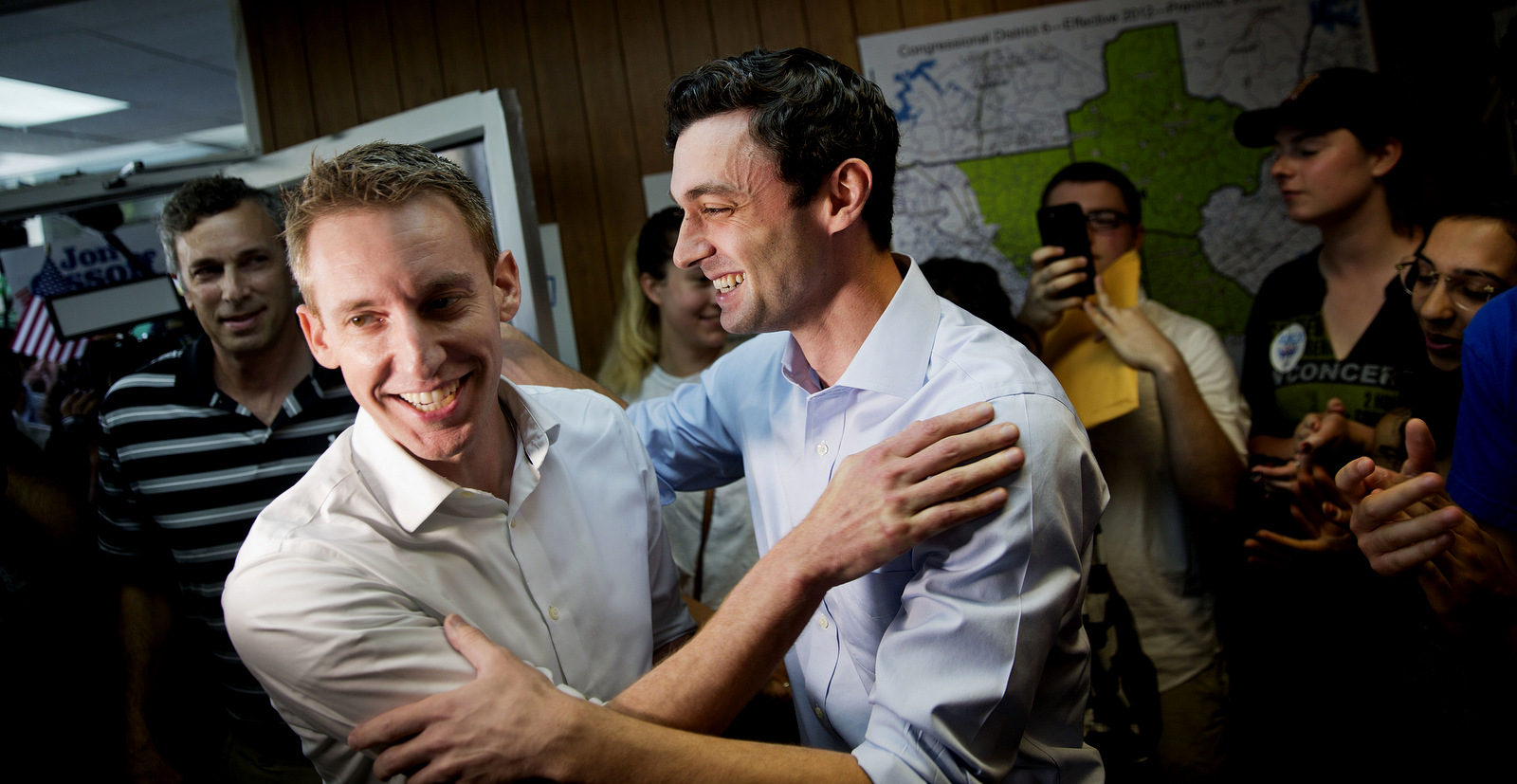WASHINGTON (Analysis) — At first glance, Jason Kander would seem to be a political consultant’s dream — or perhaps nightmare, if you’re a Republican. Approaching his 37th birthday, the former Missouri secretary of state is boyishly handsome, whip smart, a social-media savant, and appeals to both millenials and seniors. What’s more, he articulates a progressive vision for the country – single-payer health care, racial justice, environmental remediation – that appeals to the millenials who had no truck with the 2016 Democratic presidential nominee, Hillary Clinton.
And, while he’s made no official announcement, Kander is also clearly eyeing a White House run in 2020. Since losing his bid to unseat Missouri’s senior U.S. Senator, Republican Roy Blunt, he has spent much of the past year traveling the country and raising his profile with speaking engagements and media appearances on CNN as the chief spokesman for a voting-rights advocacy group, Let America Vote, formed a year ago this month with top adviser Abe Rakov.
Kander’s “Majority 54” podcast — named for the percentage of the electorate that didn’t vote for Trump in 2016 — has had more than 1.8 million total “listens,” and just last month he began advertising for a “Communications Director and Chief Speechwriter” to help devise strategy for both his voting-rights group and Kander himself. The description for the job — which pays up to $120,000 per year, according to the posting — states:
We are looking for someone with at least five years of experience, and campaign experience is highly preferred.”
If Kander takes the presidential plunge as expected, the $64K question for him, and other dyed-in-the-wool progressives contemplating a run, is not whether they can beat the incumbent — with approval ratings hovering near 40 percent so early in his term, President Donald J. Trump is eminently vincible. With roughly 920 days until the next presidential election, the pivotal question is whether the Democratic establishment has learned its lesson from the 2016 debacle and will turn to a Bernie Sanders-like progressive to rescue the party from ruination and stave off Trump’s second term.
Or will they double down on their failed strategy of running neoliberal hacks like Clinton, former Vice-President Joe Biden, or California’s newly-minted U.S. Senator, Kamala Harris?
The centripetal Democrats chase their tail
The smart money is almost certainly on the latter strategy, according to progressive activists. Since their traumatizing loss 18 months ago, the Democratic leadership has reinforced the notion that their default position is to unimaginatively parrot the GOP on bread-and-butter issues like the economy, taxes, health care, education, defense spending, military intervention abroad and austerity at home.
“What I’ve seen since 2016 is the DNC has elected a centrist, Tom Perez, to lead the party over the more progressive candidate, Keith Ellison,” said Cindy Sheehan, who became a prominent anti-war activist after her son Casey, a U.S. soldier, was killed in Iraq in 2004. Sheehan, who hosts the political blog and podcast Soapbox, added:
And any special election they’ve nominated a centrist, corporate Democrat. With Bernie Sanders we’ve seen what we saw with Jesse Jackson and Dennis Kucinich: a progressive candidate generates all of this energy and the party gets all these donations and resources, but all of that left-wing energy is subsumed into the establishment.”
Trump’s 2016 victory and the Democrats’ dilemma is the result of a bipartisan effort to isolate the most radical and progressive voices in the American body politic. Beginning with Richard Nixon’s Southern Strategy and the FBI’s counterintelligence program COINTELPRO, the federal government jailed and murdered charismatic black leftists like Fred Hampton, Bunchy Carter and Dhoruba bin Wahad, and used affirmative-action quotas to pit black and white trade unionists against one another in the competition for scarce federal jobs.
Terrified by Jesse Jackson’s progressive message and appeal to both working-class Whites and Blacks, Bill Clinton and Al Gore’s Democratic Leadership Council stoked racial tensions to marginalize progressive black politicians and strengthen the party’s relationship with big-money donors on Wall Street.

The Democrats success in that regard is Pyrrhic: unable to serve two masters — and particularly constituents with objectives as diametrically opposed as employers and employees — the party has abandoned the working class altogether, first Blacks and then Whites.
Contrary to the media fixation with Vladimir Putin, it wasn’t Russian meddling that cost Hillary Clinton the election but the DNC’s bungling. For all the cash spent on presidential campaign ads, white voters are typically evenly divided. Overwhelmingly Democratic, black voter turnout is historically critical because African-Americans represent the tie-breaking vote.
Faced with a choice between two candidates who were (and are) deeply unpopular in the black community, African-American voters simply stayed home in 2016.
What profiteth a party . . .?
Moreover, the Democrats’ victory in a special election last month could be fool’s gold. While the media and party stalwarts made much ado over Conor Lamb’s victory in a conservative district won handily by Donald Trump in 2016, they fail to note that Lamb effectively ran as a moderate Republican, a strategy that is unlikely to work nationwide. And while the Democrats are expected to retake the House of Representatives in midterm elections this fall, such a congressional shift represents a historical trend; the Democrats also lost control of the House in Obama’s second year in office in the 2010 midterms.
Should the Democrats renominate Clinton in 2020 — or neoliberal politicians like Biden, Harris or New Jersey Senator Cory Booker — the result will likely be the same. And Bruce A. Dixon, managing editor of Black Agenda Report, believes that the progressive bloom is off the Sanders rose. While polls in the 2016 primary season consistently showed the nominally socialist Sanders beating Trump in a presidential poll, Dixon told MintPress:
I think a 2020 Bernie Sanders is much less dangerous to [the GOP] than the 2016 version was. Bernie has embraced the ‘Russia is the enemy for interfering in our elections’ propaganda. He has retreated from single-payer to something that is more market based, and he has never much deviated from the bipartisan consensus of the war parties. He claims [the late democratically-elected Venezuelan President Hugo] Chavez was a dictator. And of course he embraced pro-life candidates . . . too.
On another note, Bernie will be 77 this September, and the presidential campaign starts the following January. After a grueling 20-month campaign he would be 79 when sworn in [should he win]; I think the oldest ever. He could pop a vein or start exhibiting signs of dementia or just terminal old age any time now. Old is just old; these human bodies only last so long.”
He concluded:
The only lessons Democrats have learned is that if they’re young and willing to tell attractive lies like Barack Obama did, it can be their turn next.”
While no fan of Sanders foreign policy positions, Sheehan agrees. She notes that even after the heated debates between Sanders supporters and Clinton supporters, there has not been a mass exodus of Democrats to the Green Party or another third-party alternative:
Historically we can predict what’s going to happen in 2020. While I was not a supporter, I do think it would’ve been better for the party if they’d nominated Bernie Sanders. My hope for [the disaffected Democrats] is that they break from the Democratic Party.
But you know, it all reminds me of when I would watch professional wrestling with Casey, and Brett the Hitman Hart would be the good guy. And then I’d watch two months later, and he’d be the bad guy and I’d ask Casey ‘what happened?’
The bottom line is that everyone in that ring is reading from a script, and unfortunately, the People are not the ones writing the script.”
Top Photo | Jason Kander, left, former Missouri Secretary of State, campaigns for Jon Ossoff, Democratic candidate for Georgia’s 6th congressional district, right, during a stop at Ossoff’s campaign office in Chamblee, Ga., June 19, 2017. (AP/David Goldman)
Jon Jeter is a published book author and two-time Pulitzer Prize finalist with more than 20 years of journalistic experience. He is a former Washington Post bureau chief and award-winning foreign correspondent on two continents, as well as a former radio and television producer for Chicago Public Media’s “This American Life.”


